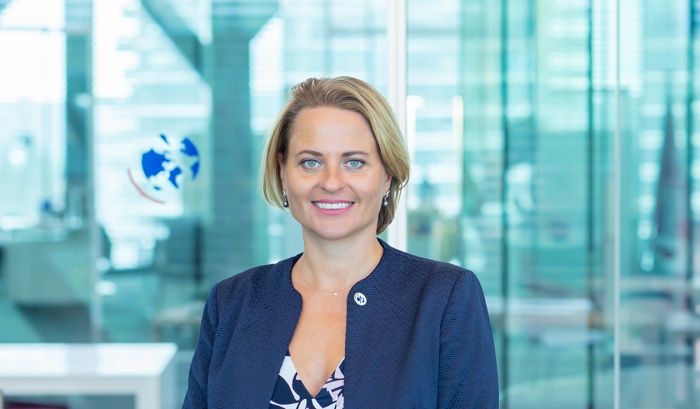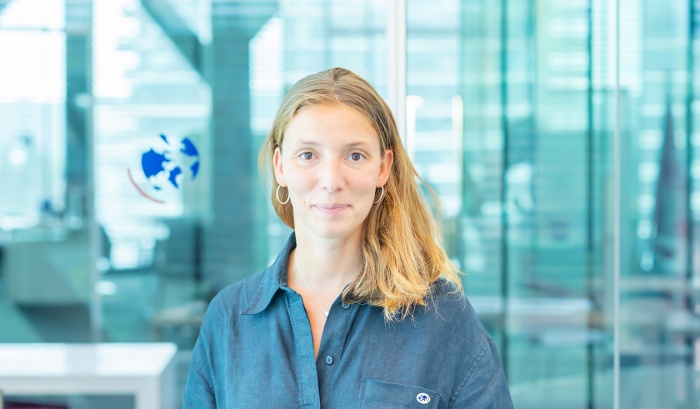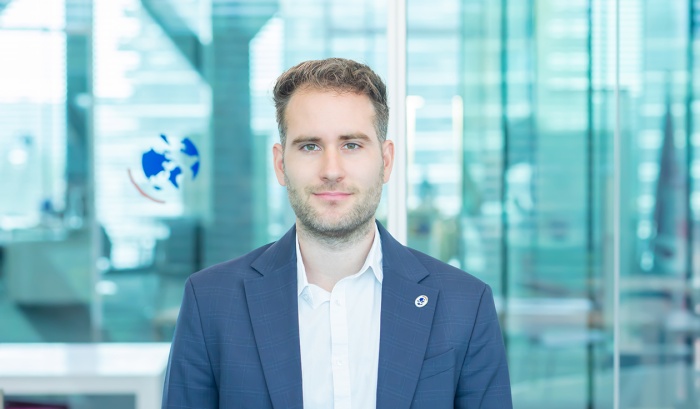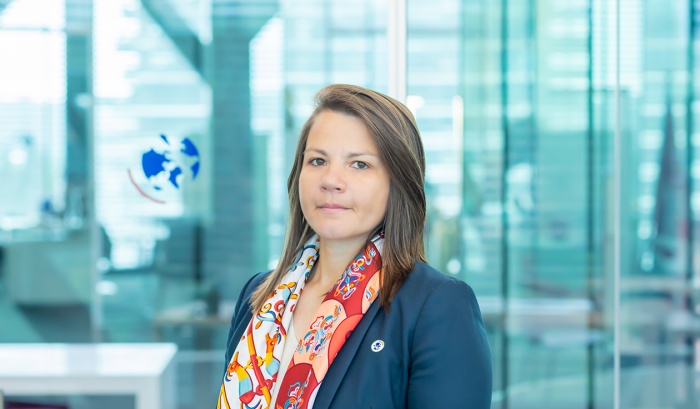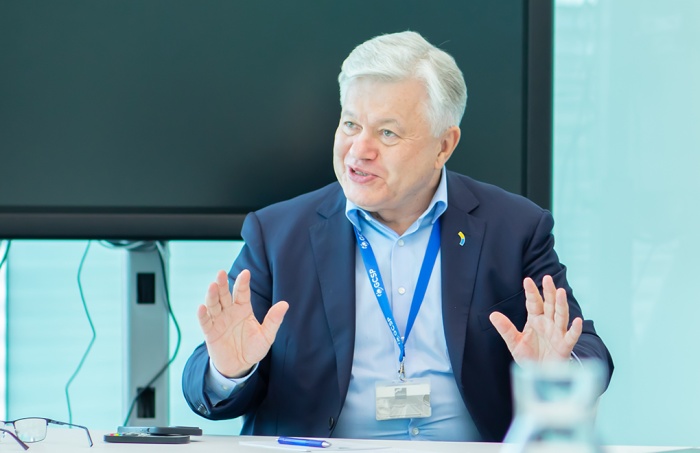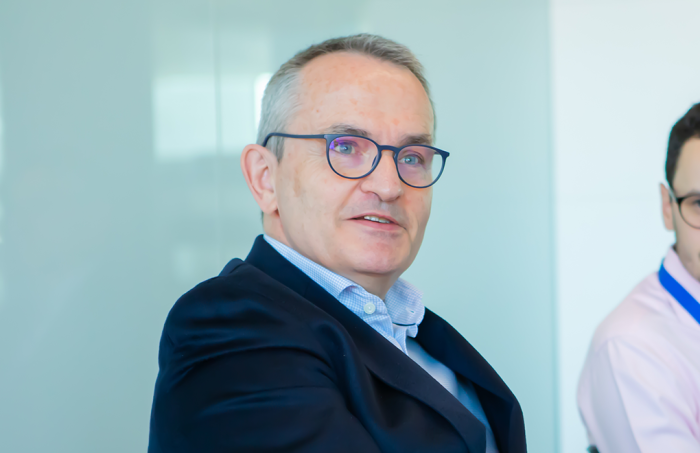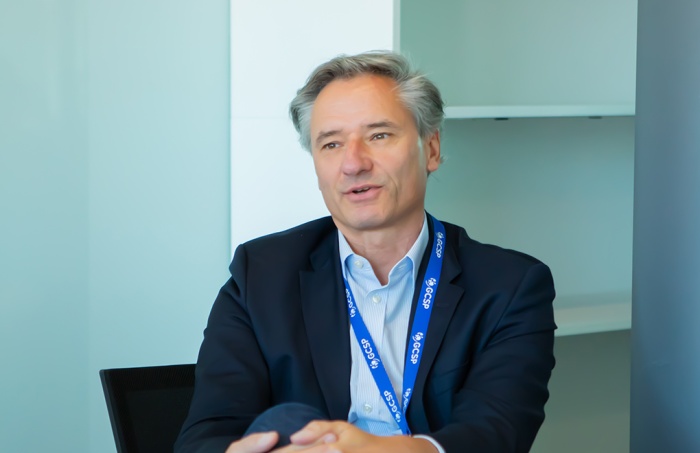International Security Dialogue Department
Amid ongoing geopolitical tensions and active conflicts, our mission is clear: to rebuild trust, generate solutions, and sustain critical dialogue on the most pressing security issues. We provide impartial spaces for in-depth discussions on European security, the war in Ukraine, the Middle East, US–China relations, space security, and the global nuclear order.
Our department builds on its long-standing reputation for bringing together policymakers, analysts, and thought leaders from Europe, Asia, the Middle East and North America for frank and insightful exchanges. These dialogues not only address immediate challenges but also help shape long-term strategic thinking.
In the face of global transactionalism and an increasingly multipolar world, our efforts focus on understanding and navigating the changing geopolitical landscape. The war in Ukraine has exposed the fragility of Europe's security architecture and demonstrated the need for a renewed vision for the future of European security – one of the many issues we are addressing through our dialogue activities.
We are also tackling emerging security challenges beyond the terrestrial domain, including space security. As global space activity accelerates, the potential for miscalculation or conflict in this domain is growing. Through our dialogue efforts, we are helping to shape norms, promote transparency, and enhance security in space.
What sets us apart is our focus on the intersections between regional instability, technological change, and great-power competition. By bringing together diplomats, experts, and civil society we generate forward-looking insights to promote a resilient, responsive, and inclusive global security environment.
The dialogue tracks conducted by the Department include, but are not limited to, the following projects:
Our projects
Ceasefire Toolkit
Through a series of consultations with some of the world’s top ceasefire and mediation experts between spring 2022 and autumn 2024, GCSP identified the need for practical guidance for parties and mediators in relation to de-escalating tensions between Russia and Ukraine and working towards a ceasefire. The objective was to develop options for achieving a sustainable ceasefire in Ukraine that could be presented when the time was ripe.
As a result, GCSP developed a toolkit of options for achieving a sustainable ceasefire in Ukraine in consultation with ceasefire experts. The 25-page “Ceasefire Toolkit”, written and produced in a user-friendly style, sets out objectives of a ceasefire, explains how to create the conditions for a ceasefire, explains how to draw a ceasefire line, underlines the need for a joint military commission, provides options for an international monitoring and verification mission, emphasizes the need to link a ceasefire to a political settlement and security guarantees, and highlights the importance of mine action.
The ceasefire toolkit was followed up on 10 March with the publication of a policy brief on possible de-escalation measures. This was done to help explain the types of measures that could help create conditions for a ceasefire.
See the latest reports/news
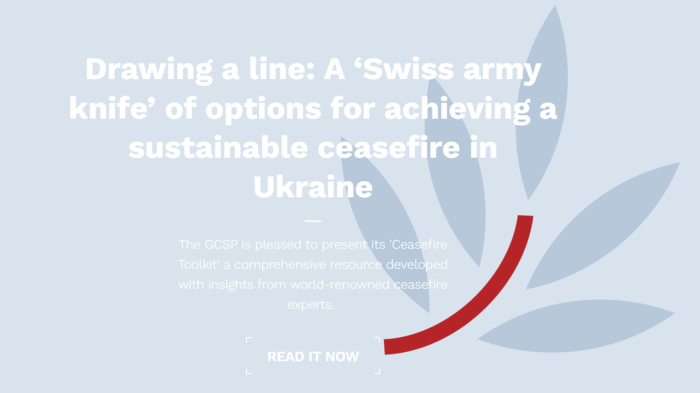
Conversations on the Future of European Security
Since May 2022, GCSP together with the Friedrich Ebert Stiftung Regional Office for Cooperation and Peace in Europe (FES ROCPE) has been convening the Conversations on the Future of European Security, a Track-2 dialogue initiative. This ongoing project brings together experts from Europe, the United States, Ukraine, Russia, and beyond to explore long-term visions for European security.
One key outcome from the 2024 meetings was the development of a Peace Matrix tool, which maps the complex, interrelated security challenges across the OSCE area. It highlights the various components that must be addressed to rebuild a sustainable security order. In addition, participants examined potential roadmaps toward a ceasefire in Ukraine, aiming to contribute to future policy planning and dialogue efforts.
See the latest reports/news
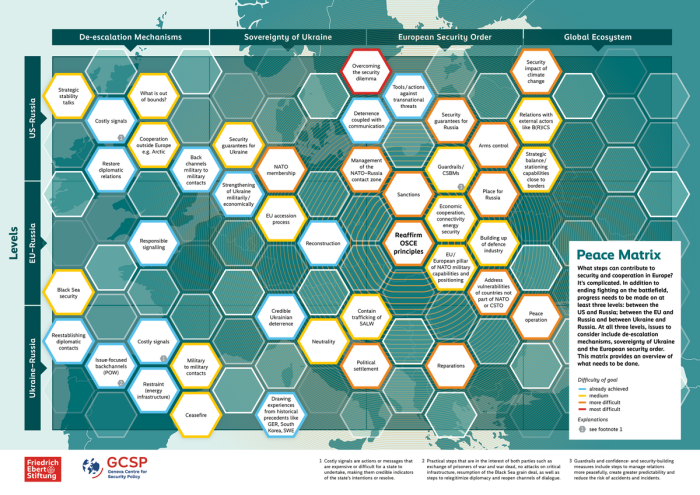
OSCE Focus Conference
Every year, this dialogue process serves the incoming OSCE chairpersonship by gathering prominent experts and high-ranking officials from the OSCE community, and providing an opportunity for informal discussion on some of the OSCE’s most pressing agenda items. Such topics include: the OSCE’s role in Ukraine during and after the war; the OSCE as a unique dialogue platform, communication channel, and promoter of greater predictability; and the challenges of leading the organisation during tumultuous times, both politically and within executive structures. The OSCE Focus Conference also fosters discussions on how to rebuild European security and the OSCE’s likely role in this process.
See the latest reports/news
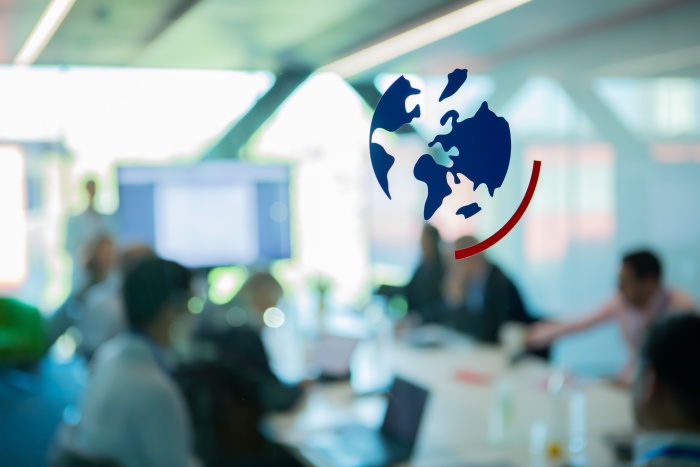
Zermatt Roundtable
The Zermatt Roundtable on Security Issues in Northeast Asia is an annual Track 1.5 dialogue organized by the GCSP and the Swiss Federal Department of Foreign Affairs (FDFA). The roundtable brings together government officials and experts from various countries to discuss the evolving security environment in Northeast Asia. Its purpose is to facilitate open, informal discussions on global and regional security trends, their interconnectedness, and key geopolitical dilemmas. The event also explores the implications of regional developments and the feasibility of establishing more permanent security mechanisms in Northeast Asia. This platform provides valuable insights into the complex dynamics shaping the region's security landscape.
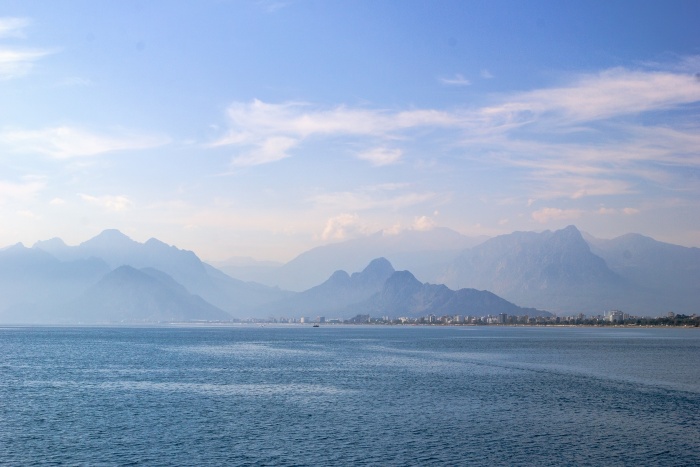
China-US Dialogue on Nuclear Nonproliferation
The GCSP has initiated a Track 2 dialogue on nuclear nonproliferation, focusing on the dynamic and complex China-U.S. relations in this field. This expert meeting has brought together leading professionals from both countries to explore shared security concerns and current challenges in nuclear nonproliferation. Participants discussed areas of agreement and identified opportunities for new initiatives, such as peaceful nuclear use. The dialogue aims to foster mutual understanding and contribute to addressing critical issues in nuclear security, with an emphasis on ongoing, constructive engagement between China and the United States. This platform facilitates meaningful exchange on global nuclear nonproliferation efforts.
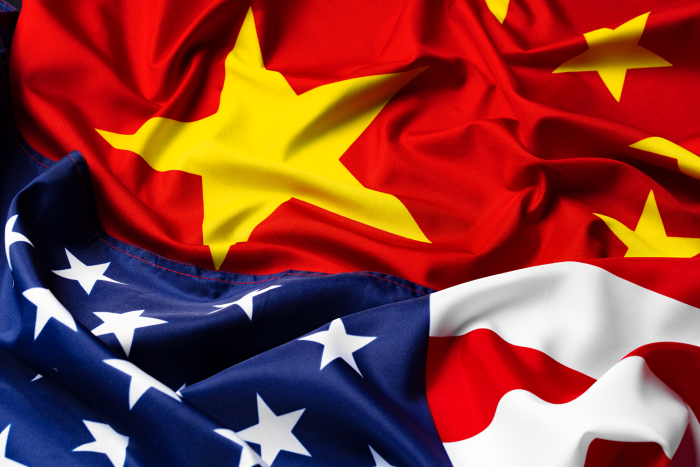
China-Europe Cyber Dialogue & Track 2 Legal Expert Group
The GCSP currently leads two related initiatives focused on cyber issues. The China-Europe Cyber Dialogue (CECD), a Track 1.5 initiative, brings together European and Chinese officials, think tanks, and academic experts. It provides a unique platform for regular exchange on various cyber topics, fostering collaboration and mutual understanding. In addition, the GCSP co-facilitates the Sino-European Expert Working Group on the Application of International Law in Cyberspace (EWG-IL), in partnership with the China Institutes of Contemporary International Relations (CICIR), Xiamen University, and EU Cyber Direct. This working group allows European and Chinese legal experts to discuss the application of international law in cyberspace.
See the latest reports/news
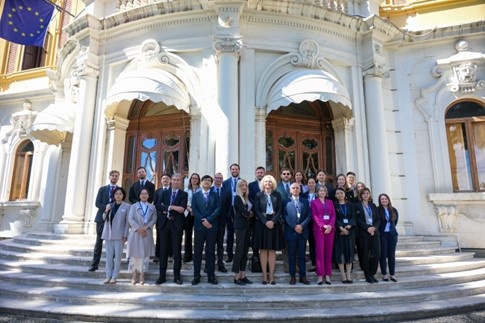
Space Security Dialogue
In response to growing geopolitical tensions and the increasing scale of space activities, the GCSP launched a new Track 2 Dialogue on Space Security in October 2024. This initiative offers a platform for informal and forward-looking discussions on key space security issues, including threat perceptions and strategic stability, international coordination on space traffic management and space situational awareness, the evolving legal framework for outer space, as well as questions related to rendezvous and proximity operations, obligations, responsible use, and verification. The dialogue convened experts from several major space-faring nations, alongside voices from academia, the private sector, and international organisations actively engaged in space governance.
See the latest reports/news
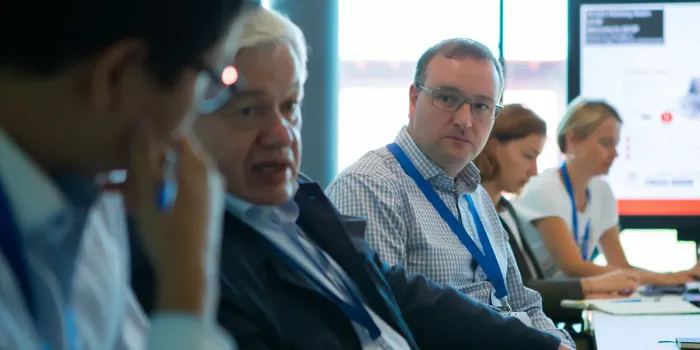
P5 Experts’ Roundtable
The GCSP has been co-organising this Roundtable together with the Strategic Foresight Group from 2022 to 2024. The P5 Expert’s Roundtable represents a diplomatic initiative focusing on catastrophic risks that was launched in September 2022 in Caen, Normandy, France. The initiative was inspired by the Normandy Manifesto for World Peace, issued by a group of Nobel Laureates and social thinkers under the auspices of the Normandy Forum in 2019. The objective was to discuss nuclear risk reduction measures among the P5 countries - China, France, Russia, UK, and USA, with a special focus on the Artificial Intelligence (AI) and Nuclear Command, Control, and Communications (NC3) nexus. The continued deterioration of the global security environment has further increased the urgency of this topic. Mentions of the use of nuclear weapons for tactical purposes have risen in both politico-military and media circles, reinforcing UN Secretary-General António Guterres’ warning that the world is one miscalculation away from nuclear annihilation. Coinciding with the ongoing polarisation among the P5, it is crucial for experts to come together and find ways to promote dialogue and common understandings to break this deadlock.
See the latest reports/news
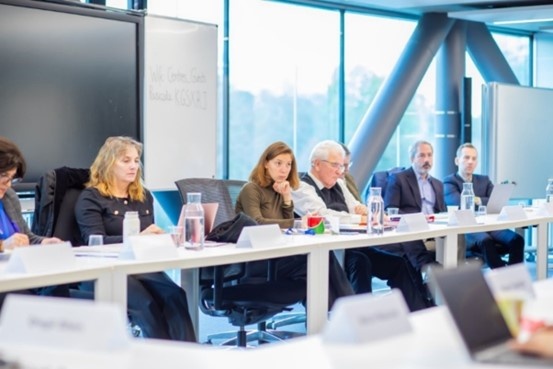
Chambésy Roundtable
The global repercussions of the ongoing war in Ukraine are deeply felt. Despite recent developments, including limited ceasefires and preparations for negotiations, the conflict's resolution remains uncertain. Addressing critical issues such as security guarantees, de-escalation strategies, and the reconstruction of the European security order is imperative. This Track-1.5 dialogue aims to convene state representatives and experts to examine the long-term implications of the Ukraine war on European security, focusing on these pivotal areas.


